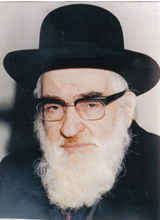Beit Midrash
- Jewish Laws and Thoughts
- Personality Development
- Anava - Humility
- Jewish Laws and Thoughts
- Pathways in Personality Development
- Humility, Holiness and Fearing Hashem
The Torah study is dedicatedto the full recovery of
Yehudah ben Hadasah Hinde Malkah
Furthermore, the more talent and capacity a humble person possesses, the more humble he becomes. As absurd as this sounds, it is true. For example, Moses, the man of God, the greatest of the great, was also the humblest of the humble. The Torah testifies to this: "And the man Moses was more humble than any other person on the face of the earth" (Numbers 12:3).
The reason for this is that he understands that whatever qualities he possesses are not his own, they are a gift from God. He himself is nothing. The more qualities he has, the more he feels dependent upon the holy One blessed be He Who gave him these qualities, the more he surrenders himself to Him. The wiser such a person is and the more he knows, the more he grasps just how much he is lacking and how little he really knows in comparison to what he does not know.
The truly wise person must necessarily be humble. And so, we see that not only do exemplary qualities not hamper humility, they are even conducive to it. This is not true regarding a conceited individual who believes that everything revolves around him, who aspires to a respected position, personal success and importance. For such a person it is only to be expected that any talent he possesses causes him to become even more conceited.
A humble person, however, places God in the center, and his one desire is to bring honor to the Almighty. He nullifies himself before God's greatness. He knows that everything comes from the holy One blessed be He, and that everything brings honor to Him, and he himself flees from personal prestige. He does not compete with others, but speaks well of them, pleased by their capacities.
Therefore, "Torah is only acquired by he who is humble." For in order to acquire Torah, one must surrender oneself to it, and the humble person surrenders himself to the Torah and makes himself a vessel for Torah understanding. A humble person pursues Torah for the sake of the Torah, in order to cling to it. This is not the case regarding an arrogant person, who acts on behalf of himself and is unable to surrender himself to the Torah.
When the daughter of the Caesar saw R' Yehoshua ben Hananiah, she exclaimed, "How is it that such outstanding wisdom is contained by such an ugly vessel?"
R' Yehoshua ben Hananiah was full of wisdom, but he apparently was not awfully attractive. He responded, "Tell me please, in what sort of vessels does your father store his wine?"
"In clay jugs," she answered.
"But everybody uses clay jugs!" he exclaimed. "Do you want to tell me that your father the Caesar uses clay jugs just like everybody else!?
"In what, then, should he store his wine?" she asked.
"You are very important people," said R' Yehoshua ben Hananiah, and you must therefore keep your wine in vessels of silver or gold."
So she went and did as R' Yehoshua ben Hananiah suggested, but not long thereafter all of the wine turned to vinegar. Her father, the Caesar, asked her who had told her to do this, and she told him that it was R' Yehoshua ben Hananiah. The Caesar went to the rabbi and asked him why he told his daughter to do this. R' Yehoshua ben Hananiah said, "Just as she said to me 'outstanding wisdom in an ugly vessel?' so did I say to her 'important wine of the Caesar in clay jugs?' "
In other words, silver and gold vessels spoil the wine on account of their importance, while in clay jugs the wine is well preserved. In a similar manner, the Torah is best preserved by a humble and unattractive person. A conceited person, instead of preserving the Torah, spoils it. Humility, then, is a necessary condition for acquiring the Torah.
49. The Components of Humility
Rabbi Zalman Baruch Melamed | Sivan 5762



















